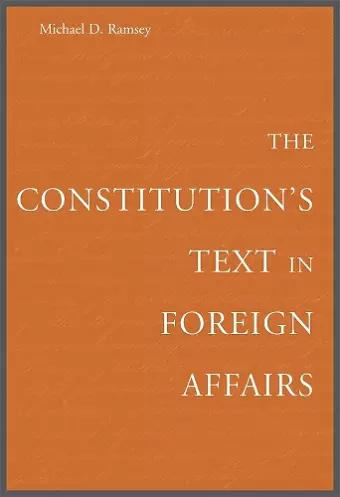The Constitution’s Text in Foreign Affairs
Format:Hardback
Publisher:Harvard University Press
Published:1st Jul '07
Currently unavailable, and unfortunately no date known when it will be back

The Constitution's Text in Foreign Affairs is impressive. Ramsey defies conventional wisdom that the words of the Constitution do not speak to most contemporary foreign relations law problems, showing instead how these words, as originally understood, can provide a nearly complete answer to fundamental modern questions of foreign relations law. This book is a real contribution to the field. -- Jack Goldsmith, Harvard Law School
Ramsey describes the constitutional law of foreign affairs derived from an historical understanding of the Constitution’s text. Examining recurring foreign affairs controversies such as the power to enter armed conflict, the author shows how the words, structure, and context of the Constitution can resolve pivotal court cases and modern disputes.
This book describes the constitutional law of foreign affairs, derived from the historical understanding of the Constitution's text. It examines timeless and recurring foreign affairs controversies--such as the role of the president and Congress, the power to enter armed conflict, and the power to make and break treaties--and shows how the words, structure, and context of the Constitution can resolve pivotal court cases and leading modern disputes. The book provides a counterpoint to much conventional discussion of constitutional foreign affairs law, which tends to assume that the Constitution's text and history cannot give much guidance, and which rests many of its arguments upon modern practice and policy considerations.
Using a close focus on the text and a wide array of historical sources, Michael Ramsey argues that the Constitution's original design gives the president substantial independent powers in foreign affairs. But, contrary to what many presidents and presidential advisors contend, these powers are balanced by the independent powers given to Congress, the Senate, the states, and the courts. The Constitution, Ramsey concludes, does not make any branch of government the ultimate decision maker in foreign affairs, but rather divides authority among multiple independent power centers.
The Constitution's Text in Foreign Affairs is impressive. Ramsey defies conventional wisdom that the words of the Constitution do not speak to most contemporary foreign relations law problems, showing instead how these words, as originally understood, can provide a nearly complete answer to fundamental modern questions of foreign relations law. This book is a real contribution to the field. -- Jack Goldsmith, Harvard Law School
In this valuable book, Ramsey evaluates the debate concerning presidential and congressional powers in foreign affairs. While many scholars on both sides of this debate argue that the Constitution itself is little help in defining the relationships between the legislative and executive branch in this area, Ramsey argues that the Constitution's text is the crucial guide to explaining how the founders saw the separate and shared powers of the two branches...In a discussion with important ramifications, Ramsey also explores the meaning of the phrase "executive power" in the 18th-century context. Ramsey argues that in foreign policy and in U.S. Supreme Court decisions regarding the powers of the president and Congress, the text of the Constitution, and therefore the intentions of the framers, has been misinterpreted. -- W. W. Newmann * Choice *
Ramsey approaches the foreign affairs text of the Constitution with high expectations. He places the words of the document front and center in his analysis, and argues that past scholars have failed to mine the text and structure of the Constitution for every insight into foreign affairs power...Writing with grace and clarity, Ramsey has produced a benchmark study that will illuminate future research but also will provide an accessible, lucid, and nicely opinionated Introduction to a set of too-long, neglected constitutional issues. -- Aziz Huq * New York Law Journal *
- Nominated for Arthur Ross Book Award 2008
ISBN: 9780674024908
Dimensions: unknown
Weight: unknown
504 pages